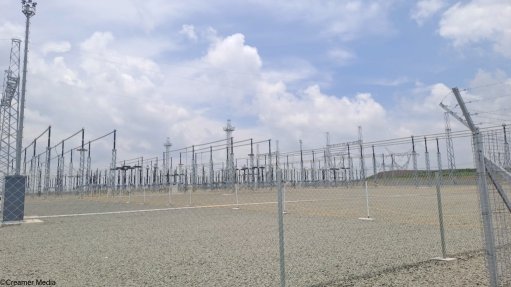Index shows positive growth for value added by the construction sector
The poor performance of the South African economy over the past two quarters is evident in construction sector activity, with the Afrimat Construction Index (ACi) having declined by 8.6% in the first quarter of this year, compared with that of the fourth quarter of 2022 and compared with marginal growth in real gross domestic product (GDP) of 0.4% quarter-on-quarter.
“The year-on-year decline in the ACI was more muted, with the ACI declining by 3.4%, compared with GDP growth of 0.2%,” says economist Dr Roelof Botha, who compiles the ACI on behalf of JSE-listed Afrimat.
He adds that a highlight of the first-quarter reading was the consolidation of positive growth for value added by the construction sector, with real expansion recorded both on a quarter-on-quarter (4.2%) and year-on-year (4.2%) basis.
“It should be pointed out that the construction sector component of GDP only includes the value added by contractors, while the ACI is based on a composite index of construction sector activity that includes another eight indicators, all of which are measured in real terms, i.e., adjusted for inflation. The ACI is, therefore, a substantially more comprehensive barometer of the state of the construction sector,” he points out.
On a year-on-year basis, the outstanding performances were the increases of almost 12% in construction sector employment and more than 4% in value added by the sector. Two other indicators – retail trade and hardware and building materials sales – also recorded positive growth rates.
“It is evident that the results of the ACI in the first quarter, compared with the fourth quarter of 2022, were mainly influenced by sharp declines in the values of building plans passed and buildings completed in the larger municipalities of South Africa.”
Further, he notes that the highest interest rates in 15 years have served to dampen the demand for new houses, as is also illustrated by the sharp decline in the number of mortgage bond applications administered by BetterBond. Due to the pervasive negative influence of higher interest rates on most of the economy’s demand components, a host of economic indicators started reversing the recovery trend from the Covid pandemic.
Construction sector activity has been hit hard by the increases in the Reserve Bank’s repo rate since the end of 2021. “The Monetary Policy Committee of the Reserve Bank seems to have overplayed its hand in continuing to raise the official bank rate against the background of a pronounced drop in consumer and producer price indices,” Botha notes.
On a positive note, he was confident that the rate hiking cycle was nearing its end, with both the producer price index (PPI) and the consumer price index (CPI) having peaked and beginning to enter a downward trajectory. “The PPI has dropped from a high of 18% in July last year to 8.6% in April, a decline of 52%, while the CPI is down from a peak of 7.8% to 6.8% currently, a drop of 12.8%.”
"Another positive development is the increase in the ratio of capital formation to GDP by both the private and public sectors during the first quarter of 2023. “Although the current combined level of 15.1% remains well below the average for emerging markets, the upward trend is encouraging,” says Botha.
More good news is that the government has "effectively admitted its negligence in the areas of maintaining and expanding the country’s infrastructure" by creating two Crisis Committees to deal with these challenges.
CEOs from some of South Africa’s largest companies have also agreed to lead work streams set up to support government in tackling the country’s prevailing crises in the energy and transport sectors, as well as debilitating levels of crime and corruption. Following a meeting between organised business and government on June 6, an agreement was reached to form a partnership to tackle the three issues, which have emerged as major obstacles to growth, development and job creation.
Key to this new initiative is the undertaking by business leaders to collaborate with the National Energy Crisis Committee and the National Logistics Crisis Committee.
“Hopefully, a much greater emphasis on private sector involvement in the planning and execution of infrastructure maintenance and development will eventually pave the way for a revival of construction sector activity in South Africa,” says Botha.
Article Enquiry
Email Article
Save Article
Feedback
To advertise email advertising@creamermedia.co.za or click here
Comments
Press Office
Announcements
What's On
Subscribe to improve your user experience...
Option 1 (equivalent of R125 a month):
Receive a weekly copy of Creamer Media's Engineering News & Mining Weekly magazine
(print copy for those in South Africa and e-magazine for those outside of South Africa)
Receive daily email newsletters
Access to full search results
Access archive of magazine back copies
Access to Projects in Progress
Access to ONE Research Report of your choice in PDF format
Option 2 (equivalent of R375 a month):
All benefits from Option 1
PLUS
Access to Creamer Media's Research Channel Africa for ALL Research Reports, in PDF format, on various industrial and mining sectors
including Electricity; Water; Energy Transition; Hydrogen; Roads, Rail and Ports; Coal; Gold; Platinum; Battery Metals; etc.
Already a subscriber?
Forgotten your password?
Receive weekly copy of Creamer Media's Engineering News & Mining Weekly magazine (print copy for those in South Africa and e-magazine for those outside of South Africa)
➕
Recieve daily email newsletters
➕
Access to full search results
➕
Access archive of magazine back copies
➕
Access to Projects in Progress
➕
Access to ONE Research Report of your choice in PDF format
RESEARCH CHANNEL AFRICA
R4500 (equivalent of R375 a month)
SUBSCRIBEAll benefits from Option 1
➕
Access to Creamer Media's Research Channel Africa for ALL Research Reports on various industrial and mining sectors, in PDF format, including on:
Electricity
➕
Water
➕
Energy Transition
➕
Hydrogen
➕
Roads, Rail and Ports
➕
Coal
➕
Gold
➕
Platinum
➕
Battery Metals
➕
etc.
Receive all benefits from Option 1 or Option 2 delivered to numerous people at your company
➕
Multiple User names and Passwords for simultaneous log-ins
➕
Intranet integration access to all in your organisation



















